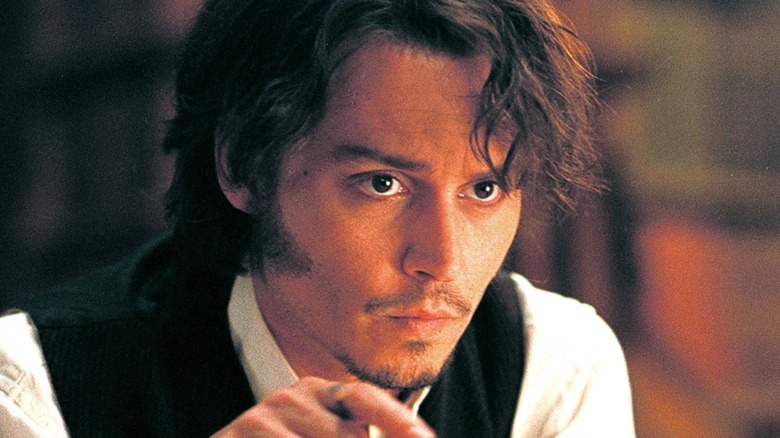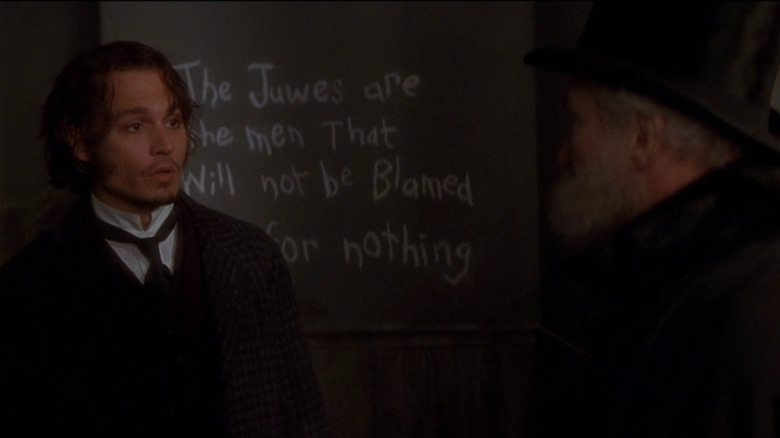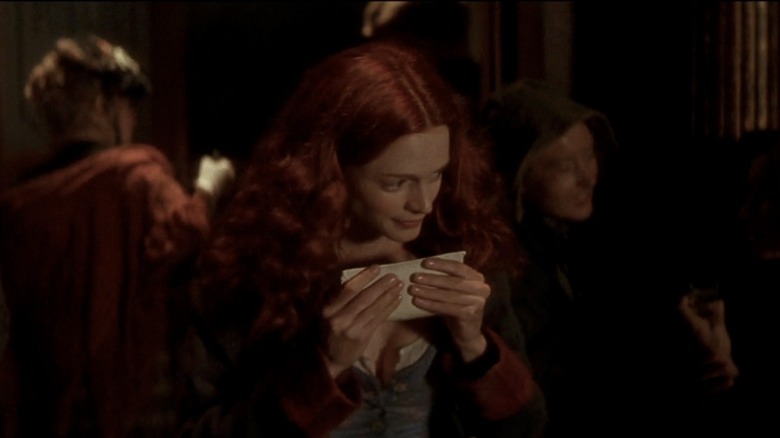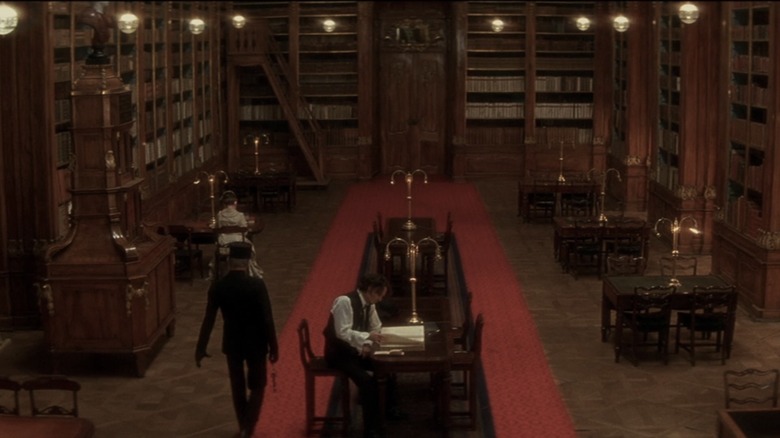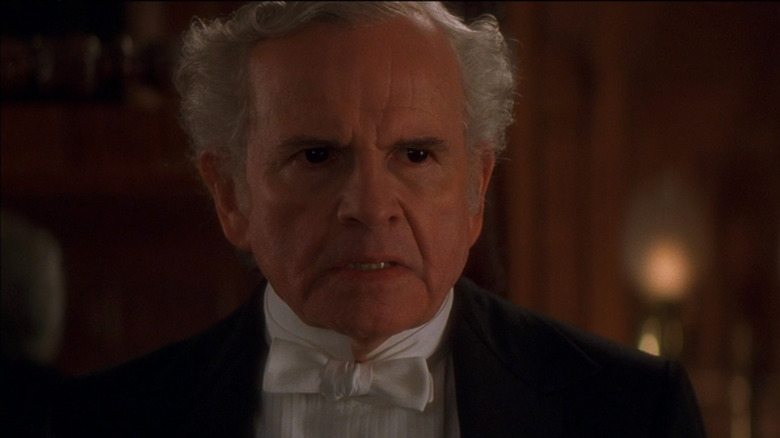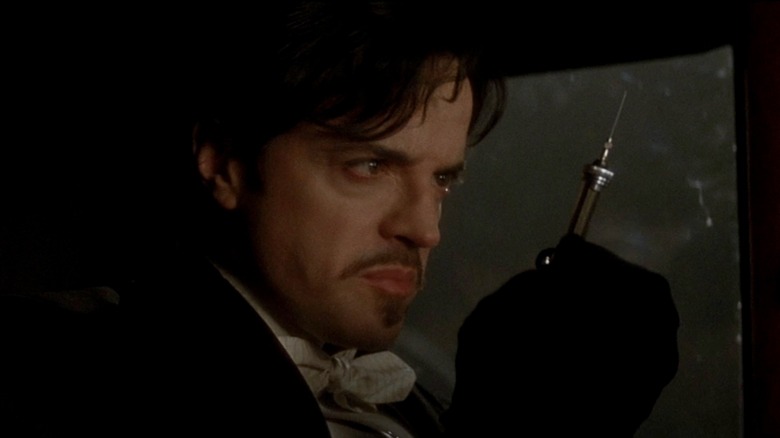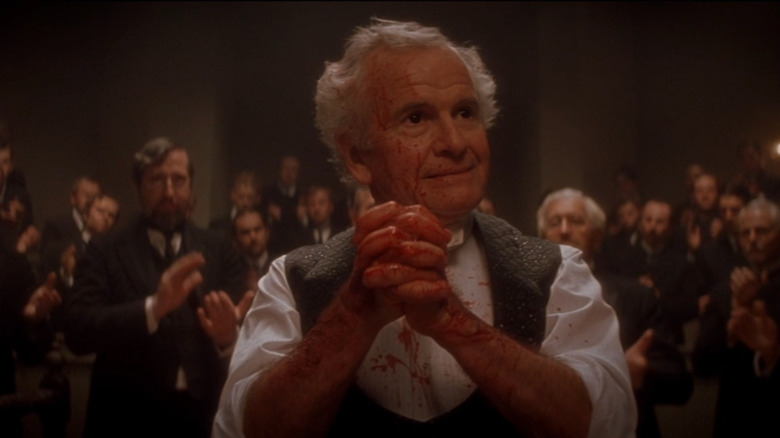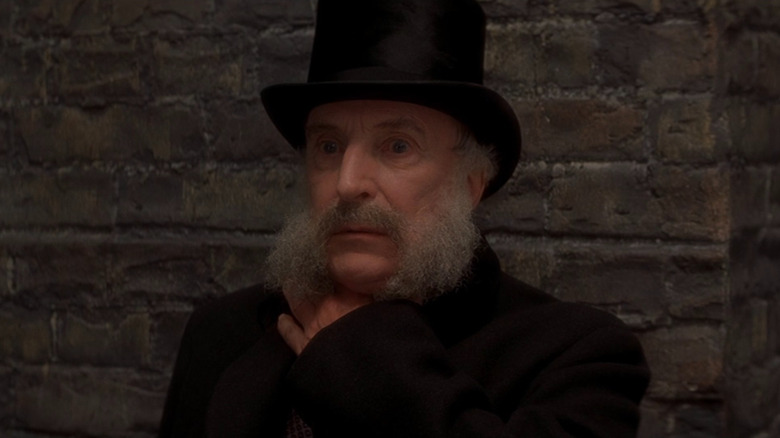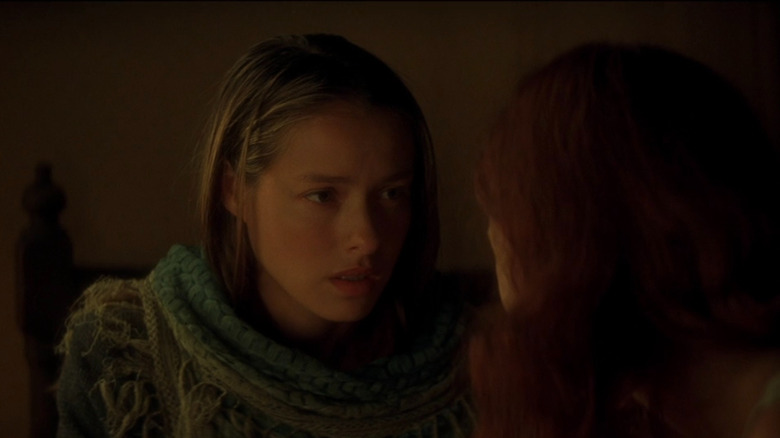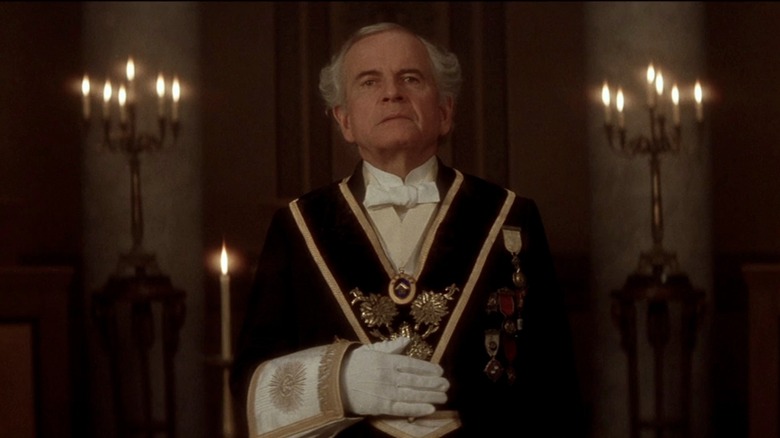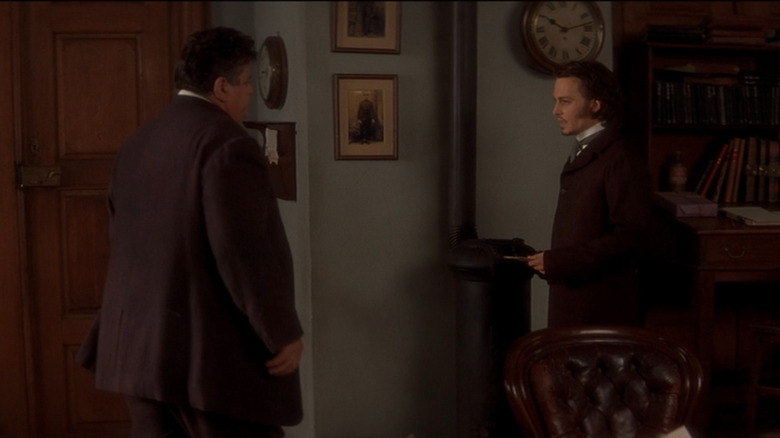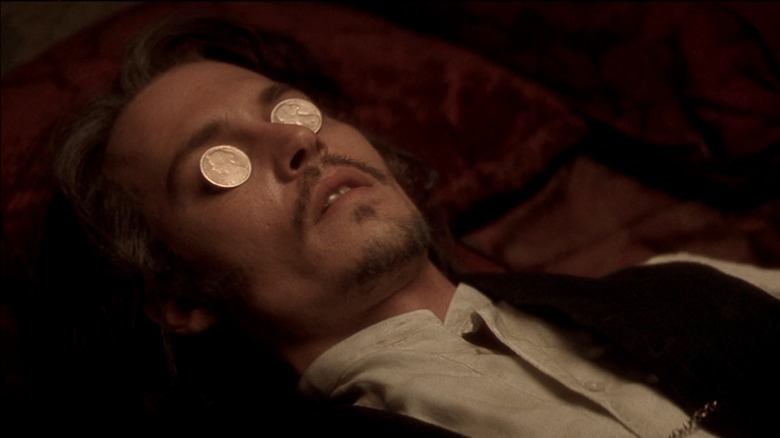The Ending Of From Hell Explained
2001's "From Hell" is an adaptation of Alan Moore's graphic novel about Jack the Ripper's infamous Whitechapel murders in Victorian-era London. While the novel's main character is the killer, the film's protagonist is the real-life Victorian cop Inspector Frederick Abberline (Johnny Depp), portrayed here as a tragic hero still reeling from the death of his wife during childbirth two years earlier. With the help of opium-induced visions and an observant potential target of the killer, Abberline uncovers a conspiracy behind the murders involving the monarchy and the Special Branch of Scotland Yard.
During his investigation, Abberline deduces that the killer is an educated, wealthy man with a knowledge of human anatomy. He believes the murders are a plot to eliminate a group of Whitechapel sex workers who witnessed the commoner Ann Crook (Joanna Page) marry Prince Albert Victor (Mark Dexter) in a secret ceremony, leading to the birth of a legitimate heir to the throne. This conspiracy theory was popularized in the 1970s by the book "Jack the Ripper: The Final Solution," but it has been discredited in the decades since. There's also nothing to suggest that Abberline was an opium user in real life.
Despite the many creative liberties that it takes, "From Hell" is an engaging film that explores corruption and class divides in Victorian London. If you found the plot twists confounding, then keep reading, as we're about to demystify the ending of this visually stunning movie. Spoilers ahead.
Scotland Yard suspends Abberline from the Ripper case
At the crime scene of Kate Eddowes (Lesley Sharp), the fourth Ripper victim, Scotland Yard's head honcho Sir Charles Warren (Ian Richardson) suspends Inspector Abberline after they quarrel over the removal of some evidence. In real life, Warren had some nearby graffiti scrubbed from a wall because it made mention of Jewish people and he feared that Christian Londoners would turn on Jewish ones if they saw it and linked it to the crime, despite the fact that the message was likely already there when the murder took place. However, in "From Hell," it's implied that Warren is destroying evidence because he feels Abberline is getting too close to the truth.
This pivotal scene kicks off the frenetic action that leads up to the conclusion of the film, letting us know that Warren is probably involved in the conspiracy behind the Whitechapel murders. This was already hinted at when Warren discussed the case during a Freemasons meeting. He undermined Abberline's investigation from the beginning, insisting that the murders couldn't be the work of an Englishman. And, when Abberline wanted to consult a surgeon, Warren declined, apparently convinced that the murderer must be a tradesman like a "butcher" or "furrier." Warren suspending Abberline from duty only strengthens the theory that he is involved in the conspiracy and is carrying out a sanctioned coverup.
Abberline leaves Mary Kelly some money
In "From Hell," Kate Eddowes and Liz Stride (Susan Lynch) are supposed to be hiding with Heather Graham's Mary Kelly on the night they are murdered. Abberline leaves a letter at the Ten Bells tavern for Mary the next morning as he had previously promised, giving her money to get off the streets while he catches the killer. In doing so, he crosses the line from professional concern to personal involvement, confirming Abberline and Mary made a surprising romantic connection, something that would have been unlikely in class-conscious Victorian society. Although this romantic sidestory gave Abberline a personal and professional motivation to solve the Ripper case, according to Casebook, it is not based on reality.
Abberline and Mary never actually met, and Abberline only knew her as Jack the Ripper's fifth and final victim. When Mary retrieves the letter from Ten Bells, the Coachman who helps the killer select his victims follows her from the tavern to the room she is renting. After opening the letter, Mary discovers Abberline left her enough money to travel to Ireland and to the safety of the peaceful village by the sea where she was born. Despite now having the money to escape, the killer will soon know Mary's location in Whitechapel, leaving it unclear if Mary can escape before he finds and kills her.
Abberline connects the Freemasons to the killings
After his suspension, Abberline visits the opium den he frequents and has visions leading him to believe the Freemasons play a part in the conspiracy, working with the Special Branch to carry out these murders for the monarchy. Abberline conducts research on the history of the Freemasons and their rituals and finds that the Ripper killings bear some similarities to the rituals depicted in the book.
Abberline soon realizes that the locations of the murders make a five-pointed star on a map of Whitechapel. Curiously, the arrangement of coins left at Annie Chapman's feet also make a star, a symbol of the Freemasons. In his Freemason history book, Abberline finds the names "Jubela, Jubelo, and Jubelum," who are said to have killed the important Masonic figure Hiram Abif. Collectively, they have been referred to as "The Three Juwes." The graffiti that was removed from the earlier crime scene made reference to the "Juwes," and this confirms to Abberline that Warren wanted it removed because it was a clue the killer left to taunt Abberline.
Abberline confronts Sir William Gull about the murders
Abberline questions Sir William Gull about the Freemasons, having noticed Gull wears a mason's ring. Abberline discusses the Freemasons' symbol being connected to the killings and points out that the ritualistic nature of the murders resembles how Jubela, Jubelo, and Jubelum were killed. He now believes that the Whitechapel murders are reenactments of their executions. Casebook points out that these types of executions and rituals were alien to Victorian-era Freemasons, another invention for the screen.
At this stage, Abberline suspects that Gull is Jack the Ripper. This is a divergence from the unfounded conspiracy theory, which favors Prince Albert Victor as the killer. When Gull reveals himself to be the murderer, his light eyes change color, becoming disturbingly dark. Gull's eyes changing as he reveals he is the killer suggest two possibilities. One analysis is that the eye color change is simply a visual cue for the audience, alerting them to the fact that Gull has gone mad. Another viewpoint is that Gull is under the influence of something supernatural, which connects with the source material.
After confessing, Gull says, "One day men will look back and say I gave birth to the twentieth century." Abberline replies, "You're not going to see the twentieth century," cocking his pistol as he does. "From Hell" highlights a cultural move away from the spiritual realm (represented by the Freemasons in the film) and toward science (as represented by modern investigative techniques and advancing medical procedures).
Abberline gets kidnapped
Abberline isn't able to stop Gull because Ben Kidney (Terence Harvey) from the Special Branch of Scotland Yard knocks him unconscious before Abberline can fire his gun. Kidney kidnaps Abberline, and when Abberline wakes up in a fast-moving carriage, Dr. Ferral (Paul Rhys) is trying to inject him with a syringe. We can assume that since Gull found out Abberline was addicted to opium during their first consultation that they intend to give him a fatal overdose to get him out of the way.
This abduction confirms the Special Branch, the Freemasons, and the monarchy are all involved in a plot to kill the sex workers from Whitechapel who witnessed Prince Albert Victor's marriage ceremony to Ann Crook. As the physician to the royal family, Gull connects the monarchy and the Freemasons to the conspiracy. Kidney from the Special Branch, who abducted Ann, is also a member of the Freemasons. So are Chief Warren and Dr. Ferral, who we saw inducted to the Freemasons earlier in the film.
Abberline injures Dr. Ferral while defending himself from the injection. He then smashes Kidney through the carriage window where he becomes caught in the spokes of a wheel, causing a deadly accident that wipes out both Kidney and the coachman. After the carriage has landed on its side, Abberline climbs out and runs into the damp darkness of London, hoping to find Mary Kelly before Gull murders her.
The doctor kills his last victim
Gull arrives at the room Mary Kelly was renting, dressed dramatically in a tux and a top hat, and proceeds to kill his last victim. Unlike the previous murders, he attacks with reckless abandon, slashing wildly and leaving her corpse unrecognizable. While killing her, Gull fantasizes that he is giving a lecture at the medical school, suggesting he has indeed lost touch with reality.
Despite the gruesome way Jack the Ripper killed his victims, "From Hell" employs flashes of imagery and the suggestion of mutilation rather than relying on gratuitous gore. Co-director Allen Hughes told Sci-Fi Online: "Our plan from the outset was to take a note from Hitchcock that less is more. Hopefully, people feel the horror from better filmmaking than more direct horror. In the end, we were happy with what we did."
The film is ambiguous about whether Gull was always mad. It could be that he became imbalanced after his deteriorating health forced him to stop working as a surgeon. Regardless of when Gull lost his way, we would all rest easier at night believing only a monster could commit these heinous crimes.
Sir Charles Warren reinstates Inspector Abberline
Chief Warren reinstates Abberline at the fifth crime scene, promising that the killer will "be taken care of." He adds: "I swear to it... It's over. He's done. I give you my word." With this statement, Warren essentially admits Abberline is right about the conspiracy behind the murders and that, rather than eliminate Abberline, the powers that be have bought his silence with a job and an assurance that they will deal with the murderer outside of the criminal justice system.
When Abberline threatens to bring everyone involved in the conspiracy down, Warren comes back with, "Don't be a fool, inspector. You will be very closely watched," implying they could always decide to remove Abberline from the equation at a later date if he proves to be a danger. Although this conspiracy theory has been discredited in real life since it was popularized, the film uses it as a way to highlight the injustice that existed at the time, with the rich and powerful living by different rules. These are themes that the Hughes brothers often explore in their films.
Co-director Albert Hughes told The John Hopkins Newsletter, "This is a ghetto story. It concerns poverty, violence, and corruption, which are themes we deal with in our movies because they fascinate us. These particular characters happen to be white, but all poor people have the same problems." The mystery of who the killer was has mesmerized people for years, but "From Hell" reminds us that his victims were real people, not characters in a horror story.
Abberline realizes the victim is not Mary Kelly
After being reinstated, Abberline enters the room to supervise while another officer describes the crime scene and the positioning of the victim on the bed where she was killed. Kneeling down on the ground, grieving Mary Kelly's death, Abberline listens, while looking at what Gull did to the woman he was falling in love with. Abberline suddenly picks up a piece of the victim's hair, realizing the hair is the wrong color to belong to Mary. It only appears red because it was stained by the bloodshed during the heinous murder.
Abberline keeps this information to himself, wanting everyone to believe Mary is dead. When Abberline checks in at the Ten Bells tavern and learns Mary left him a letter before sunrise, we come to understand that the Belgian girl Ada (Estelle Skornik), who was staying with Mary during the two previous murders, is the actual victim. It was Mary, wearing Ada's scarf as a disguise, whom we saw leave the room shortly before the murder.
This is a departure from reality. Ripper experts believe Mary was Jack the Ripper's last victim. According to Casebook, some other writers have suggested Mary wasn't the last victim because the victim was mutilated beyond recognition. Despite the state of the corpse, records say Mary's "live-in lover" identified the body. This fictional twist is a satisfying element of "From Hell," leaving the audience with a glimmer of hope for Mary's future.
Sir William Gull is punished by the Freemasons
After high-ranking Freemason Lord Hallsham (Peter Eyre) is chastised by Queen Victoria (Liz Moscrop) for the outrageous manner in which he approached the prince's problem, the Freemasons put Gull on trial for his crimes as Jack the Ripper. During his trial, Gull says no one present can judge him because he receives his orders directly from The Great Architect.
For most of us, this is confirmation that Gull is mentally ill, but viewers familiar with the graphic novels will recognize this as a reference to Gull's supposed communications with God. Dr. Ferral lobotomizes Gull, while Chief Warren and Inspector Abberline watch. After the lobotomy, Gull will live out his days in an asylum. It is worth noting that this is not based on reality — Gull has been linked with the crimes by numerous writers of fiction in the years since they happened but he was by all accounts a gifted physician who cared deeply about the poor.
In the film, the wealthy and powerful use cruel medical treatments and imprisonment in asylums to silence those who could reveal the monarchy's involvement in the Whitechapel murders and Ann's legitimate marriage to Prince Albert Victor. The themes explored in "From Hell" show how poorly mental illness was dealt with in the Victorian era and how psychiatry was weaponized to silence women, just as they silenced Ann Crook with a lobotomy.
Abberline burns Mary Kelly's letter
Sometime later, after it seems Abberline is no longer being watched by the Special Branch, Sergeant Godley (Robbie Coltrane) encourages Abberline to go to Ireland to be with Mary Kelly. Abberline burns the letter Mary wrote telling him where to find her and baby Alice, whom she recovered from the orphanage that the Special Branch placed her in after they abducted her mother, Ann Crook. Abberline says that if he went to Ireland to be with Mary, the Special Branch might notice that he ran off or changed his patterns, and it would put Mary and Alice in danger of being discovered alive by the Special Branch.
Instead of going to see her, Abberline stays and protects Mary and Alice by watching the Special Branch. Godley argues that if Abberline doesn't take this chance and goes to Ireland to be with Mary, he will turn into the old man at the pub, crying in his ale about the girl who got away. Still, Abberline can't be swayed, and it appears he has accepted the loneliness that comes with being a tragic hero.
The ending of "From Hell" is only a partial victory for Abberline. He is content in knowing Mary is alive in Ireland, but he doesn't feel Jack the Ripper's other victims got justice, despite the killer being incapacitated by a lobotomy and living in an asylum. Abberline must live with the knowledge that his superior at Scotland Yard allowed this miscarriage of justice to happen, and that they carried it out at the behest of the monarchy.
Abberline dies of an opium overdose
In the last scene of "From Hell," we see a vision of Mary Kelly standing outside a humble cottage, surrounded by green hills, sheep, and a pathway to the sea. She calls for Alice before a child crests the hill, calling, "I'm coming mother." This vision melts away as Abberline's eyes go vacant; he's lying on a couch in a squalid opium den. Sergeant Godley enters the opium den to retrieve Inspector Abberline but finds Abberline has died.
When Godley checks for a pulse on Abberline's wrist, he discovers two coins for the ferryman in Abberline's hand, and Godley understands this was an intentional overdose. With tears in his eyes, Godley places the coins over Abberline's eyes — as Abberline did for the victims in Whitechapel — before saying, "Goodnight, sweet prince." The meaning behind Abberline's place of death is huge. As Empire put it: "Opening and closing with its copper in an opium den allows for a reading of the film as a delirious nightmare distantly based on historical fact."
That's the ending of "From Hell" in a nutshell. However, it's worth mentioning that, in reality, Abberline didn't take his own life after the Ripper case. "The very next year he was involved in the notorious Cleveland Street Scandal investigation," reports Casebook. "He retired in 1892 and lived until 1929. In later years he did some private detective work with the American Pinkerton Agency." That might have made for a good sequel, but, from a filmmaking point of view, things would only really be wrapped up when Mary Kelly's secret died with Abberline.
If you or anyone you know is having suicidal thoughts, please call the National Suicide Prevention Lifeline at 1-800-273-TALK (8255).
